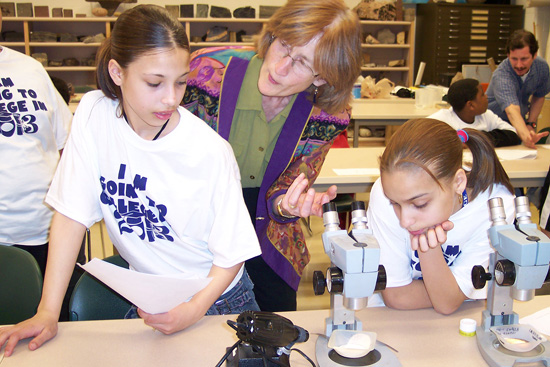NSF Grant to Support Women’s Advancement in the Geosciences
 |
| In center, Suzanne OConnell, associate professor of earth and environmental sciences, teaches visiting 5th grade students about rocks. O’Connell was awarded a grant from the National Science Foundation to support building a community of women geoscience leaders. |
| Posted 04/02/07 |
| A three-year, $488,367 grant from the National Science Foundation (NSF) to Suzanne OConnell, associate professor of earth and environmental sciences, and Mary Anne Holmes, research associate professor at the University of Nebraska Lincoln, will help women from all academic levels take part in a community that stresses professional development in the geosciences.
The project, titled, Building a Community of Women Geoscience Leaders is funded by the NSFs ADVANCE Partnerships for Adaptation, Implementation and Dissemination Award. Wesleyans portion of the grant is$259,593. We want to overcome isolation, a known factor in the non-retention of women scientists, teach women skills to help them succeed in academia, and develop strategies with female and male department chairs to develop an environment that is more supportive of women, OConnell says. The grant will fund a program designed to increase the retention of women in geoscience programs. The program, called GANE, or Geoscience Academics in New England, will target colleges and universities located in the northeast region of the country. OConnell and Holmes hope to implement professional development workshops and writing retreats to provide women necessary skills to reach their full potential as academic and scientific leaders. Geoscience department chairs will be offered special workshops, as well, with an emphasis on increasing gender balance. These workshops will address strategies to increase department diversity, while providing a productive environment for all faculty. A database of academic geoscientists will be created to measure progress. Results may be shared with other regions across the country. OConnell and Holmes are both members of the Association for Women Geoscientists, an international organization devoted to enhancing the quality and level of participation of women in the geosciences. It also aims to introduce girls and young women to geoscience careers. In 2000, OConnell was given the associations Outstanding Educator Award. OConnell says it was a physician who inspired her to become a professional woman. When OConnell was 10, she fell off a fence and was taken to the hospital. Lying for hours in a large green room, she saw many incredible sights, but what amazed her most at the time was that the person who treated her was a woman. A woman doctor! That was a revelation, OConnell recalls. At that time, I was planning to be a nun, but now it occurred to me that maybe I could be a doctor. That woman, just by her presence, started me thinking. Like that physician, we are all role models. Who knows what ideas we can implant in young heads. OConnell didnt grow up to be a physician or nun, but she did receive a Ph.D studying marine sediments, focusing on how large quantities of land sediment get transported to the deep sea by turbidity currents. She teaches Wesleyan students about sedimentology, marine geology, climate change and oceanography, and researches past climate change by studying sediment cores from the ocean. I don’t think we can always know how we are influencing others, OConnell says. But I do think that we, as women geoscientists, help every young girl to know that she has wider career options. It’s often not easy, but it is exciting. OConnell was featured in the March 2007 issue of Nature, Volume 446 Number 7133, in an article titled, Leaks in the pipeline: Why do women remain curiously absent from the ranks of academia? The article is online at http://www.nature.com/naturejobs/2007/070315/full/nj7133-346a.html. |
| By Olivia Drake, The Wesleyan Connection editor |

